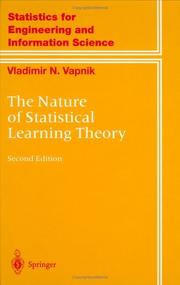| Listing 1 - 2 of 2 |
Sort by
|

ISBN: 0387987800 1441931600 1475732643 9780387987804 Year: 2000 Publisher: New York : Springer,
Abstract | Keywords | Export | Availability | Bookmark
 Loading...
Loading...Choose an application
- Reference Manager
- EndNote
- RefWorks (Direct export to RefWorks)
The aim of this book is to discuss the fundamental ideas which lie behind the statistical theory of learning and generalization. It considers learning as a general problem of function estimation based on empirical data. Omitting proofs and technical details, the author concentrates on discussing the main results of learning theory and their connections to fundamental problems in statistics. These include: * the setting of learning problems based on the model of minimizing the risk functional from empirical data * a comprehensive analysis of the empirical risk minimization principle including necessary and sufficient conditions for its consistency * non-asymptotic bounds for the risk achieved using the empirical risk minimization principle * principles for controlling the generalization ability of learning machines using small sample sizes based on these bounds * the Support Vector methods that control the generalization ability when estimating function using small sample size. The second edition of the book contains three new chapters devoted to further development of the learning theory and SVM techniques. These include: * the theory of direct method of learning based on solving multidimensional integral equations for density, conditional probability, and conditional density estimation * a new inductive principle of learning. Written in a readable and concise style, the book is intended for statisticians, mathematicians, physicists, and computer scientists. Vladimir N. Vapnik is Technology Leader AT&T Labs-Research and Professor of London University. He is one of the founders of.
Mathematical statistics --- Computational learning theory --- Reasoning --- Apprentissage informatique, Théorie de l' --- Raisonnement --- Computational learning theory. --- Reasoning. --- Théorie de l'apprentissage informatique --- Théorie de l'apprentissage informatique --- Statistics . --- Artificial intelligence. --- Statistics for Engineering, Physics, Computer Science, Chemistry and Earth Sciences. --- Artificial Intelligence. --- AI (Artificial intelligence) --- Artificial thinking --- Electronic brains --- Intellectronics --- Intelligence, Artificial --- Intelligent machines --- Machine intelligence --- Thinking, Artificial --- Bionics --- Cognitive science --- Digital computer simulation --- Electronic data processing --- Logic machines --- Machine theory --- Self-organizing systems --- Simulation methods --- Fifth generation computers --- Neural computers --- Statistical analysis --- Statistical data --- Statistical methods --- Statistical science --- Mathematics --- Econometrics

ISBN: 9780387308654 0387308652 9786610716234 1280716231 0387342397 Year: 2006 Publisher: New York, NY : Springer New York,
Abstract | Keywords | Export | Availability | Bookmark
 Loading...
Loading...Choose an application
- Reference Manager
- EndNote
- RefWorks (Direct export to RefWorks)
Twenty-?ve years have passed since the publication of the Russian version of the book Estimation of Dependencies Based on Empirical Data (EDBED for short). Twen- ?ve years is a long period of time. During these years many things have happened. Looking back, one can see how rapidly life and technology have changed, and how slow and dif?cult it is to change the theoretical foundation of the technology and its philosophy. I pursued two goals writing this Afterword: to update the technical results presented in EDBED (the easy goal) and to describe a general picture of how the new ideas developed over these years (a much more dif?cult goal). The picture which I would like to present is a very personal (and therefore very biased) account of the development of one particular branch of science, Empirical - ference Science. Such accounts usually are not included in the content of technical publications. I have followed this rule in all of my previous books. But this time I would like to violate it for the following reasons. First of all, for me EDBED is the important milestone in the development of empirical inference theory and I would like to explain why. S- ond, during these years, there were a lot of discussions between supporters of the new 1 paradigm (now it is called the VC theory ) and the old one (classical statistics).
Estimation theory. --- Théorie de l'estimation --- Estimation theory --- Mathematical Statistics --- Computer Science --- Mechanical Engineering - General --- Mechanical Engineering --- Engineering & Applied Sciences --- Mathematics --- Physical Sciences & Mathematics --- Information Technology --- Artificial Intelligence --- Théorie de l'estimation --- EPUB-LIV-FT LIVSTATI SPRINGER-B --- Estimating techniques --- Mathematics. --- Applied mathematics. --- Engineering mathematics. --- Applications of Mathematics. --- Least squares --- Mathematical statistics --- Stochastic processes --- Math --- Science
| Listing 1 - 2 of 2 |
Sort by
|

 Search
Search Feedback
Feedback About
About Help
Help News
News